
SDG 2 – Indicator 2.5.1 – Access to food security knowledge
The Universitas Sriwijaya Faculty of Agriculture goes to the villages
Farmers are the backbone of food production, yet many face challenges that can affect their productivity, income, and resilience. Addressing these challenges requires access to reliable information, practical skills, and expert advice, which is often out of reach for smallholder farmers. To bridge this gap, the Farmers’ Knowledge Enhancement Clinic and Outreach Program is designed to provide farmers with direct access to valuable agricultural resources, personalized advice, and hands-on training. Through targeted support and community engagement, the program empowers farmers to adopt sustainable practices, increase yields, and improve their livelihoods.
Through clinics and outreach activities, that bring agriculture faculty team into villages, agricultural experts, local universities and community organizations work together to bring the latest knowledge, innovations and best practices directly to farmers. This approach promotes self-sufficiency, improves food security and strengthens rural communities. The program is regularly conducted by the Faculty of Agriculture, Sriwijaya University.
The Faculty of Agriculture, Sriwijaya University has established a clinic for pest and disease control services and training to improve knowledge and skills for farmers and food producers. This clinic is aimed at achieving food security, especially through efforts to reduce yield losses during on-farm cultivation and post-harvest, as a function of safeguarding the sustainable agriculture movement. Introduction of parasitic and predatory natural enemies and productive chili cultivation practices through IPC (Integrated Pest Control) and GAP (Good Agriculture Practice).
These clinic activities are carried out in two directions, namely: (1) Outreach activities through field practices for students, guided by professors and experienced lecturers; and (2) free consultation for farmers and food producers who want to discuss their problems or obstacles faced and/or desire to increase productivity or efficiency in resource management.
Other services include training farmers in isolation of plant diseases and control of biologicals; production of fertilizer by students using local microorganisms; enrichment of knowledge on integrated pest and disease control using natural enemies; introduction of natural enemies including predators, parasitoids, and entomopathogens; production of plant-based pesticides and production of biologicals; and encouragement of students to participate in community service activities.
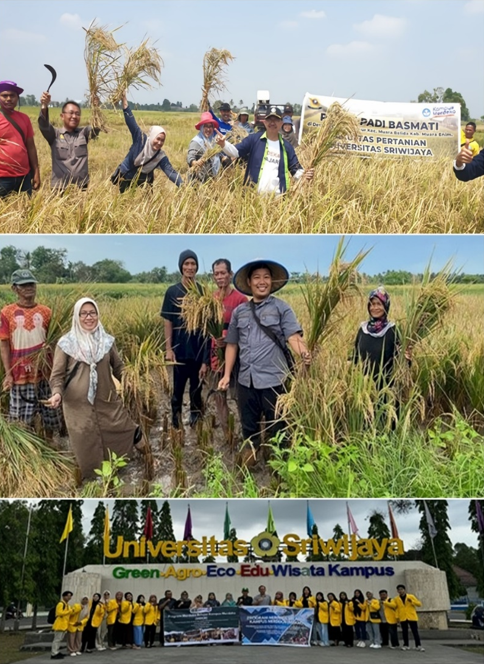
Links:
- https://www.rmolsumsel.id/peneliti-polsri-dan-unsri-kolaborasi-ajarkan-petani-teknik-bertani-dan-pasarkan-padi-tanpa-jalur-tengkulak
- https://unsri.ac.id/web-fakultas/informasi/5/detail-informasi/1042/acara-puncak-dan-orasi-ilmiah-dies-natalis-ke-60-fakultas-pertanian-universitas-sriwijaya
SDG 2 – Indicator 2.5.2 – Events for local farmers and food producers
Community services to wetland farmers
Wetland farmers play a vital role in sustaining both local communities and fragile ecosystems. However, they often face unique challenges due to the complex nature of wetland environments, including unpredictable water levels, soil salinity, and climate impacts. To support these farmers and promote sustainable agricultural practices, Community Services for Wetland (Including Peatland) Farmers programs provide essential resources, training and support tailored to their specific needs. These services help farmers improve productivity, adapt to environmental challenges, and protect the rich biodiversity of wetlands.
The UNSRI campus is located near and surrounded by wetlands. Therefore, the development of science and technology at UNSRI has focused on wetland management to improve the livelihoods of farmers and communities living in inland, tidal and peat swamps. The UNSRI Community Services for Wetland Farmers brings together academics and students to empower farmers, enhance food security, and build resilience to environmental and economic pressures through knowledge sharing and information exchange.
The University of Sriwijaya (UNSRI) routinely allocates a budget for lecturers, together with their supervised students, to organize knowledge transfer activities for local farmers and food producers. This knowledge transfer process is conducted after making initial observations about the potential of the land and the availability of materials or tools that are financially affordable for local farmers. This knowledge transfer and agricultural skills enhancement program is managed and funded by the Institute for Research and Community Service (LPPM).
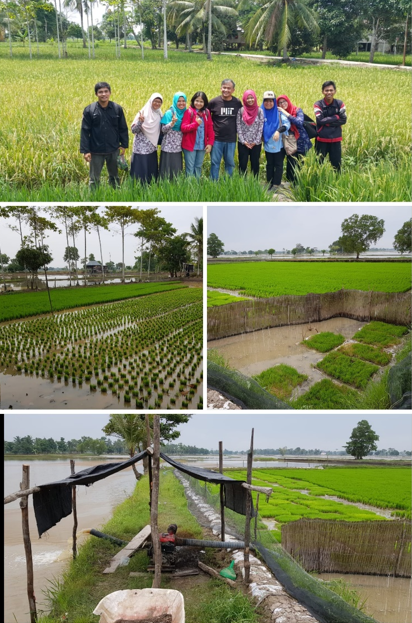
Links:
- https://sdlp.bsip.pertanian.go.id/berita/bersama-fakultas-pertanian-unsri-bsip-sdlp-kaji-ulang-sni-pemetaan-tanah-dan-lahan-gambut
- https://www.antaranews.com/berita/2484929/pertanian-unsri-ajak-bersinergi-selesaikan-masalah-lahan-basah
- https://www.antaranews.com/berita/2900825/solusi-keterbatasan-lahan-optimalisasi-3-in-1-dikembangkan-unsri
SDG 2 – Indicator 2.5.3 – University access to local farmers and food producers
Agricultural modernization and farmer welfare
Agricultural modernization is a transformative process that has the potential to reshape the future of food production, address global challenges and significantly improve farmer welfare. As the world faces increasing demand for food, the impacts of climate change, and a growing population, the agricultural sector must evolve to ensure food security, sustainable practices, and farmer livelihoods. Agricultural modernization is not just about adopting new technologies or practices, but about creating an inclusive, resilient and sustainable agricultural system that prioritizes the well-being of farmers, especially those in rural and underserved communities, such as 4 in 1 farming in urban areas by Prof Benyamin Lakitan and team in Faculty of Agriculture, Sriwijaya University.
Agricultural modernization involves a wide range of innovations, from advanced farming technologies and precision agriculture to improved crop varieties and sustainable resource management. These innovations have the potential to dramatically increase agricultural productivity, reduce environmental impacts, and improve farmers’ incomes and well-being.
The technology used by the community around the Sriwijaya University campus for crop cultivation or agricultural production is still relatively simple. The slow adoption of modern technology by farmers is not because advanced technology is not available around farmers, but because the technology offered is financially unaffordable for farmers. Even if the financial mode is made by the government through an interest-free loan, farmers are still reluctant to use advanced technology. The use of advanced technology means an increase in the cost of farming for farmers. On the other hand, an increase in land productivity is often followed by a decrease in agricultural commodity prices. Thus, increased productivity does not guarantee an increase in farmers’ financial benefits, but it certainly leads to an increase in farm operating costs.
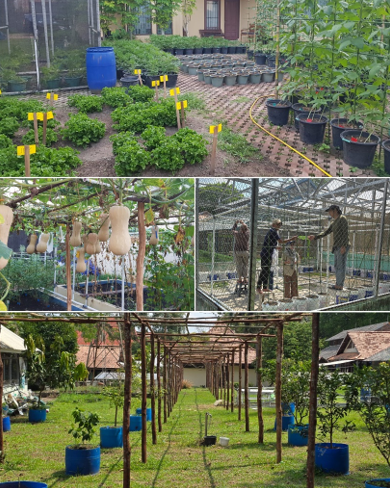
Links:
- https://www.antaranews.com/berita/4251827/ketua-lppm-unsri-palembang-kembangkan-urban-farming-4-in-1
- https://fp.unsri.ac.id/wp-content/uploads/2023/10/RENSTRA-FP-2021-2025.pdf
SDG 2 – Indicator 2.5.4 –Sustainable food purchases
Support for local farmers in the marketing of their organic rice
Rice productivity in farmers’ fields can be increased through the use of appropriate technology, but higher rice yields do not always translate into higher farmer incomes. In the agricultural commodity industry in emerging markets, increases in production are often followed by decreases in selling prices, depriving farmers of the expected profit. Repeated occurrences of such incidents discourage local farmers from increasing the yield of their rice fields.
The Sriwijaya University Faculty of Agriculture team has taken the initiative to assist in the distribution of rice marketing from their harvest to prevent the price of rice from dropping sharply as the harvest increases. Producers are also instructed to use an organic rice growing system, which ensures that customers won’t be at risk from agrochemical residues.
When the selling price is increased in proportion to the amount of human labor required to ensure that the rice sold is 100% free of pesticide contamination, urban dwellers can usually understand.
Some types of healthy rice include ‘beras koksi’, ‘healthy rice’ , ‘Basmati Rice’, Purple Label Mekongga rice, which is free of artificial pesticides. Entomopathogenic fungal enrichment and compost provide additional nutrients for the plants.
If necessary, water pumps are provided to ensure that the rice plants have the water they need throughout their life cycle. A ‘jajar-legowo’ plant system with a 2:1 ratio is used in the plant layout. The PUR-PLSO team, the Faculty of Agriculture, Sriwijaya University, and the Karya Usaha Farmers’ Association, Pelabuhan Dalam Village, work together to produce the seed. In addition, an expert from the Faculty of Agriculture is developing an application of Pak Tani to help farmers to sell organic rice and other organic products to consumers, besides through other online platforms.
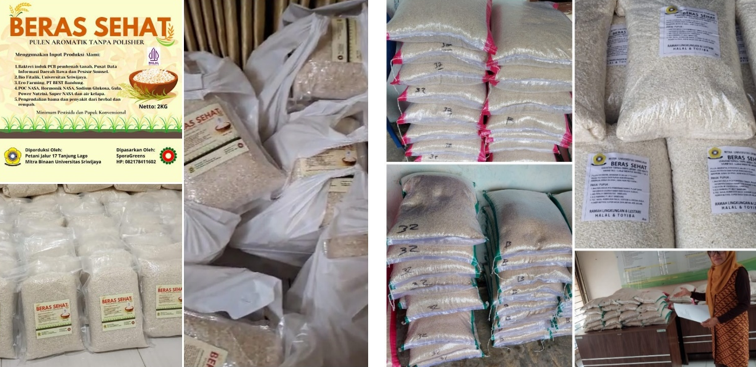
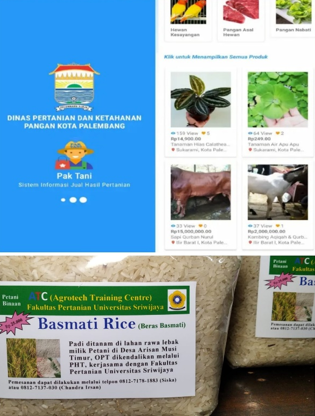
Links:
- https://sumsel.idntimes.com/news/sumsel/feny-agustin/petani-sumsel-bisa-jual-hasil-panen-lewat-aplikasi-pak-tani
- https://www.rmolsumsel.id/peneliti-polsri-dan-unsri-kolaborasi-ajarkan-petani-teknik-bertani-dan-pasarkan-padi-tanpa-jalur-tengkulak
- https://www.scribd.com/presentation/616402612/Aplikasi-Pak-Tani
- https://sites.google.com/view/sporagreens/home
